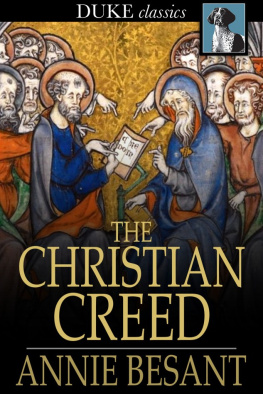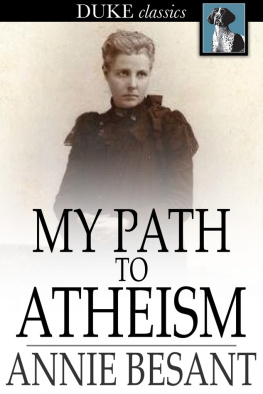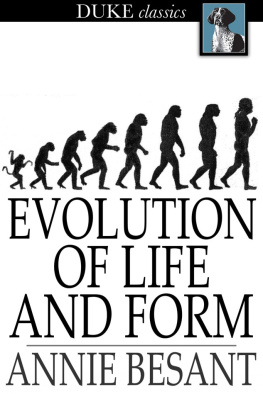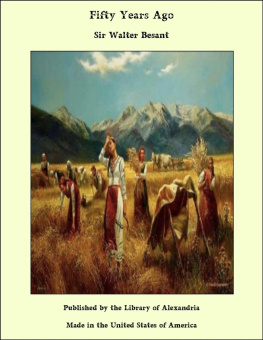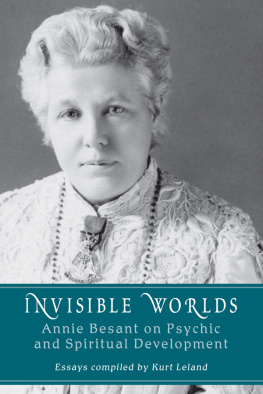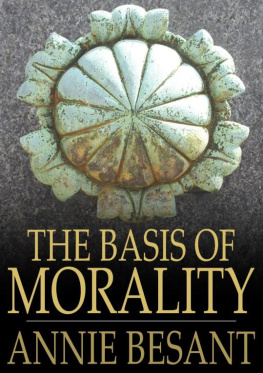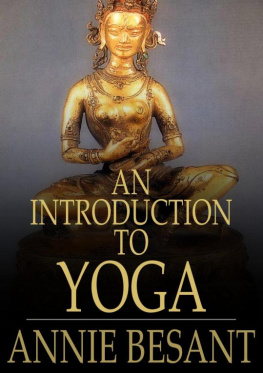Annie Besant - The Christian Creed: Or, What It Is Blasphemy to Deny
Here you can read online Annie Besant - The Christian Creed: Or, What It Is Blasphemy to Deny full text of the book (entire story) in english for free. Download pdf and epub, get meaning, cover and reviews about this ebook. year: 2014, publisher: Duke Classics, genre: Science. Description of the work, (preface) as well as reviews are available. Best literature library LitArk.com created for fans of good reading and offers a wide selection of genres:
Romance novel
Science fiction
Adventure
Detective
Science
History
Home and family
Prose
Art
Politics
Computer
Non-fiction
Religion
Business
Children
Humor
Choose a favorite category and find really read worthwhile books. Enjoy immersion in the world of imagination, feel the emotions of the characters or learn something new for yourself, make an fascinating discovery.
- Book:The Christian Creed: Or, What It Is Blasphemy to Deny
- Author:
- Publisher:Duke Classics
- Genre:
- Year:2014
- Rating:4 / 5
- Favourites:Add to favourites
- Your mark:
- 80
- 1
- 2
- 3
- 4
- 5
The Christian Creed: Or, What It Is Blasphemy to Deny: summary, description and annotation
We offer to read an annotation, description, summary or preface (depends on what the author of the book "The Christian Creed: Or, What It Is Blasphemy to Deny" wrote himself). If you haven't found the necessary information about the book — write in the comments, we will try to find it.
When political activist Annie Besant discovered the spiritual practice known as Theosophy, it changed her life, bestowing upon her a sense of tranquility and purpose. When she came under attack by religious leaders who were suspicious of this unfamiliar faith, Besant fired back with both guns blazing, publishing this scathing but meticulously thorough critique of Christianity.
The Christian Creed: Or, What It Is Blasphemy to Deny — read online for free the complete book (whole text) full work
Below is the text of the book, divided by pages. System saving the place of the last page read, allows you to conveniently read the book "The Christian Creed: Or, What It Is Blasphemy to Deny" online for free, without having to search again every time where you left off. Put a bookmark, and you can go to the page where you finished reading at any time.
Font size:
Interval:
Bookmark:

Or, What it is Blasphemy to Deny
First published in 1883
ISBN 978-1-62013-916-5
Duke Classics
2014 Duke Classics and its licensors. All rights reserved.
While every effort has been used to ensure the accuracy and reliability of the information contained in this edition, Duke Classics does not assume liability or responsibility for any errors or omissions in this book. Duke Classics does not accept responsibility for loss suffered as a result of reliance upon the accuracy or currency of information contained in this book.
A struggle has began, which promises to be one of the fiercest that thiscentury has seen, between the bigots and persecutors on the one hand andthe supporters of free speech on the other.
It appears, then, worth while to look closely into this Christian creed,which claims the right to imprison and torture men of pure life fornon-belief in its tenets. Christianity threatens us with persecutionhere and damnation hereafter if we do not believe its doctrines. "Hethat believeth not shall be damned," says Jesus. "He that believeth notshall be imprisoned and pick oakum," says Mr. Justice North. The threatof damnation would trouble us little if it stood alonewe could put offconsideration of that until we arrived in the other world; but thethreat of imprisonment here is unpleasant. If we are to burn for everhereafter, the Christians might really allow us to enjoy ourselves here;is their malice (like their hell) such a bottomless pit that an eternityof torture is not enough to fill it up?
Let us see what we must believe on peril of damnation and Newgate. (1)We must believe the "Holy Scriptures of the Old and New Testaments to beof divine authority;" (2) we must believe each "one of the persons inthe Holy Trinity to be God," while (3) we also believe that there arenot "more gods than one;" (4) we must believe the "Christian religion tobe true;" we are strictly forbidden to publish any "ludicrous matterrelating to God, Jesus Christ, or the Bible, or the formularies of theChurch of England as by law established," and are warned that we shallnot be saved by our remarks being "intended in good faith as an argumentagainst any doctrine or opinion."
(1) We must believe the Holy Scriptures of the Old and New Testament tobe of Divine Authority.
This first demand on our faith is a very large one, and can only be metby refusing to read any scientific book, to look at any geological orantiquarian collections, to study any kind of natural knowledge; we musterase from our memories all the facts we have learned about the world;we must reject purity and decency of morals; we must revert to acondition of barbarous ignorance and barbarous conduct before we canbelieve very many parts of the Holy Scriptures are of divine authority.Still, as we are to be imprisoned and damned for not believing this, wemust try, and we had better examine a little more exactly what we are tobelieve on divine authority. Only some of our imposed feats ofleger-de-foi will be examined. Those who can accomplish these will notbungle over the rest.
It is of divine authority that god made "a firmament in the midst of thewaters" and divided the waters, putting some above it and some below,and this firmament is "heaven" (Gen. i., 68). This heaven has windowsin it which let the rain through (Gen. vii., 11), and when these windowsare closed the rain stops (Gen. viii., 2). It has doors, through whichthe manna was rained down on the Israelites (Ps. lxxviii., 23, 24). This"sky" is very "strong," as is indeed necessary remembering all it has tosupport above it, and resembles "a molten looking-glass" (Job. xxxvii.,18). Another reason why it should be very strong is that god has "set"in it the sun, moon and stars. Some of the stars are large and solid,and require a very strong setting.
My unbelieving reader, you may have some difficulty in crediting allthis. You may argue that the sky is not strong at all, but is only avast space, and that to apply the word strong to space shews grossignorance. Divine authority says the sky is strong, and if you persistin believing facts instead of the Bible, you will at least find Newgatestrong and its space limited. You may argue that the stars are at veryvarious distances, and cannot all be set in one arching roof resemblinga molten looking-glass; that when it rains, the rain is due tocondensation of watery vapor within our atmosphere, at a distance of atthe most very few miles, and not to the opening of any windows at adistance of many billions of miles; that the firmament must be at least5,480,490,000,000 miles away, as the stars are set in it, and thenearest fixed star is at that distance, while the furthest is beyondcalculation. All these contentions of yours are facts, I admit, but theyfly in the teeth of the fictions which are of divine authority; and asMr. Justice North is armed with full power to vindicate the divineauthority, you had better, if you want to keep out of gaol, give up thefacts and pretend to believe in the fictions.
It is of divine authority that god made grass and herb and fruit tree onthe "third day of creation," the day before he created the sun, two daysbefore he made fishes and birds, and three days before he made animals.In the face of this it is a mere trifle, my dear sceptical reader, thatno herb could yield seed, no fruit tree could yield fruit, without theaid of the sun. It is quite true that a plant without the sun-rays canform no chlorophyll; that without chlorophyll no starch, no reparationnor growth of tissues can proceed. What are these mere botanical factsbeside the divine authority of the Holy Scriptures? It is also true thatin the study of fossils no traces of all these grasses, herbs, and fruittrees are found precedent to all animal life. That the earliest livingthing which has left a trace was an animal, not a plant. That fishesprecede fruit trees in the fossilised history of the globe, althoughfruit trees precede fishes in the divinely authoritative fable. Thesegeological facts must follow the botanical, my heretic, and you must becontent to take the Holy Scriptures on faith, for they are not eventales founded on fact.
It is of divine authority that sun, moon, and stars were created on thefourth day, after the world had been in existence for three. It is truethat to talk of a member of a solar system like our earth as existingthree days before the central sun came into being is to talk nonsense.But that is of no importance if the nonsense is of divine authority. Itis also true that the light travelling from part of the Milky Way at therate of 186,000 miles per second would take 9,000 years (Madler) toreach our earth, so that if the Holy Scriptures are of divine authoritywe should be unable to see these stars, which we nevertheless do see.Who would rashly put the testimony of everybody's eyes against theauthority of this old book written in an unknown tongue, by an unknownauthor, at an unknown date? If the stars are there, they ought not tobe, and if we can see them we ought not to be able to do so. I am notsure that they are not committing a silent and perpetual blasphemy bytheir very existence; but then Mr. Justice North cannot reach them toput them out, odious as is the outrage they commit on the feelings ofthe Christian public, and I doubt if the sentence of damnationthreatened by Jesus would run in that distant spot.
It is of divine authority that on the 6th day of creation, just 5,887years ago, god created man, male and female. It is true that man hasleft his bones in the ground as a record of his existence hundreds ofthousands of years ago, although he has only existed during 5,887 years.But that was a thoughtless and irreverent action on his part, whichcannot be allowed to have any weight as compared with the divineauthority of the Holy Scriptures. Men should not leave their bones aboutin caves and drifts as arguments for the wicked unbeliever and puzzlesfor the faithful soul.
Font size:
Interval:
Bookmark:
Similar books «The Christian Creed: Or, What It Is Blasphemy to Deny»
Look at similar books to The Christian Creed: Or, What It Is Blasphemy to Deny. We have selected literature similar in name and meaning in the hope of providing readers with more options to find new, interesting, not yet read works.
Discussion, reviews of the book The Christian Creed: Or, What It Is Blasphemy to Deny and just readers' own opinions. Leave your comments, write what you think about the work, its meaning or the main characters. Specify what exactly you liked and what you didn't like, and why you think so.

